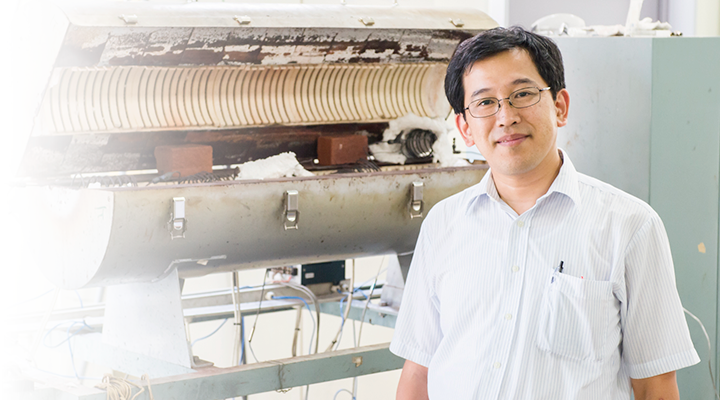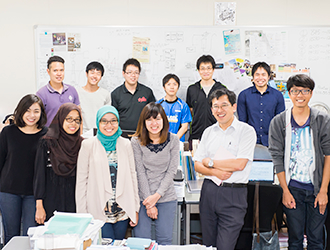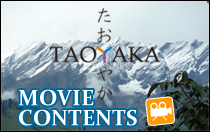
INTERVIEW
Advanced research into biomass and
environmentally friendly energy
Giving assistance of biomass
effective utilization technology
in the less favored region
Technical Formation Course
Graduate School of Advanced Science and Engineering
Prof. Yukihiko Matsumura
Advanced research into biomass and
environmentally friendly energy
Finding a solution to the energy crisis with the development of biomass technology

Professor Yukihiko Matsumura is primarily advancing research into biomass. Biomass is the organic matter which is a byproduct of animals and plants such as grass, trees and seaweed. The research shows that by successfully utilizing biomass, the production of energy and materials is possible.
The Professor was quoted in saying that “using fossil fuels increases the level of carbon dioxide, it can also be said that fossil fuels themselves will soon be exhausted. This is research into dealing with such a situation. Biomass is a renewable resource, and since it is a product of grass and trees, it grows while absorbing carbon dioxide as long as it is exposed to sunlight. Even if it releases carbon dioxide when it is burned, this contributes as a counter-measure against global warming caused by carbon dioxide emissions since there is a process of reabsorption.”

The technology is still in development in order to effectively utilize this kind of biomass, various methods are being researched however in the professor’s laboratory he is currently working on the “Supercritical water gasification” method.
The professor explains that “when biomass is placed into a state of high temperature-high pressure such as supercritical water, it will disintegrate in the blink of an eye and become vapor. I will utilization this vapor as energy since it is comprised of burnable gases such as hydrogen and methane.”
In addition, there is also another method that requires boiling the biomass.

“When grass and trees are boiled in the correct circumstances, from the 3 types of bi-products (cellulose, hemicellulose and lignin), only Cellulose remains. I am then able to change this into salt by way of enzymatic and microorganism treatment, after which the salt is reformed into ethanol”. Thus what is extracted is known as bioethanol.
In Professor Yukihiko Matsumura laboratory, technological development is underway from various angles such as the efficient gasification of biomass to the utilization of simple equipment.
Here they acquire the minimum amount of fundamental knowledge toward utilizing biomass.

The educational subject which Professor Yukihiko Matsumura is responsible for includes an English lecture “Biomass Utilization”. When using biomass, the 3 phases of resources, conversion and utilization are required, however of these, the contents of the lecture include conversion and utilization. Currently the Professor shares responsibility with 2 other specialist professors.
“The field I am responsible for is thermochemical conversion”. Other than myself, another professor is charged with teaching Biochemical Conversion which utilizes microbes. Finally, I lecture on how the utilization process works. The aim of this lecture is to understand in detail what methods are available and the principles of how to effectively and cleanly utilize biomass.
Professor Yukihiko Matsumura states that “In particular, biomass as a resource is largely present in developing countries, however its utilization is extremely inefficient. Thereupon for example, if the gasification process is incorporated, this will lead to a higher level of effective utilization. The first step which is required is to understand this concept”.
Hence in his lectures, the professor tries to incorporate as many complex numerical formulas and chemical terminologies as he can with the necessary minimum explanations. Without a background in engineering, the contents of the lecture are able to be understood well enough by students of culture and society of the Taoyaka Program.
With a firm grasp of the fundamentals as well as the opportunity to gain various perspectives

a student of this project who is being advised by Professor Yukihiko Matsumura himself, is currently working on an on-site project team. This student, has undertaken 3 courses and as a team will go to a disadvantaged region and examine the systems or technology of the area with the goal of putting into practice what they have learnt.
The target region is Kitahiroshima-cho in Hiroshima Prefecture It is said that they utilize the tomato residue there effectively.
Professor Yukihiko Matsumura added that “above all else my students consider that after having grown the tomatoes, applying the gasification process with high temperature-high pressure to the excess residue, the resulting energy can be utilized. This is not only an introduction, when in the case of using this technology, we consider what merits this region has as a system and and if there are any issues with it”.
Furthermore, the project plan underway currently considers the merits of “local development” combined with a cycling tour.
Professor Yukihiko Matsumura delightfully mentioned that “she came from Thailand to learn about the environment but in her 3rd year was admitted onto the Taoyaka Program. She is a very capable and hard working student”.
Professor Yukihiko Matsumura greatly endorses the Taoyaka Program.
The Professor confirmed that “so far, because I have participated in the movement of cross-disciplinary programs myself, I think that sharing different fields outside of one’s own with others is an extremely important program. At that time I think there are two important things. Number one is having a firm grasp of your field. If you do not have such fundamentals, I think you will not improve. The second is the ability to understand a variety of values. I think that the purpose of this program is to train students to have such viewpoints such as what others consider to be important as well as themselves”.

As the program pushes on the professor greatly expects the growth of his students.
The professor went on to claim that “it should be a wonderful experience to give ideas and push on with things for ourselves”. It will also be practice into mutual understanding while cooperating with others. From here on this will be evaluated and become something to be worked on, basically I trust in my students. I think that from the student’s response of the program, we will certainly get good results.”

![]()
Yukihiko Matsumura Professor
Mechanical Engineering Program, Division of Advanced Science and Engineering, Graduate School of Advanced Science and Engineering
April 1, 2020 – Professor, Graduate School of Advanced Science and Engineering, Hiroshima University
April 1, 2007 – March 31, 2020 Professor, Graduate School of Engineering, Hiroshima University
April 1, 2001 – March 31, 2007 Assistant Professor, Graduate, School of Engineering, Hiroshima University
April 1997 – March 2001 Assistant professor, Tokyo University
May 1994 – March 1996 Research Fellow, Hawaii University
April 1993 – March 1997 Research Associate, Tokyo University





